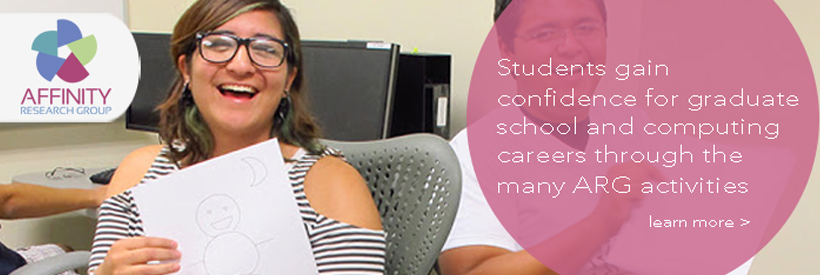Developing Student Research
The Affinity Research Group (ARG) model emphasizes the development of student research skills and those required for cooperative work. The ARG model provides both undergraduate and graduate students with opportunities to learn, use, and integrate the knowledge and skills that are required for research with those required for cooperative work. The existing course focuses on three fundamental aspects that have been identified to contribute to success of undergraduate research: research methods, experimentation and validation, and technical writing and presentations.
The undergraduate research intervention addresses the causes associated with the retention and advancement of students into graduate school. It is well documented that undergraduate research experiences motivate students to pursue graduate studies, and it develops research skills that can help them to be successful in graduate studies. The ARG model incorporates mechanisms that address persistence, a critical characteristic for academic success. For example, it provides opportunities for faculty and students to interact outside the classroom; engages students as role models for each other; fosters a “student culture” in which students can interact with each other and discuss issues in a competent manner; helps students clarify and maintain goals; and involves students in their college-learning experience. Through experiences gained in research groups and research courses, students are connected with role models, students interact with faculty outside the classroom, students develop oral and written communication skills, and students hone their technical and research skills. As a result, they will be better qualified and motivated to pursue graduate studies.
Overview
The Affinity Research Group (ARG) model provides students with opportunities to learn, use, and integrate the knowledge and skills that are required for research with those required for cooperative work. To learn about the ARG model, we suggest that you:
- Review the Affinity Research Group Model: Creating and Maintaining Effective Research Teams Handbook
- Review the publication
- Attend an Affinity Research Group Model workshop
Core Components
The three core components are: the definition of a group’s core ideology; active fostering of student connectedness; and application of deliberate management practices. Through the ARG model, faculty mentors create and sustain a cooperative environment that explicitly develops skills to make students successful in research, academe, and the workforce. As a result, students and faculty, in particular those from underrepresented groups, can reach higher levels of productivity and achievement. Each component is described below.
Core Ideology
Affinity Research Groups adopt a core ideology consisting of two essential components: core values and a sense of purpose that goes beyond reaching the goals of the research project. This philosophy drives decisions and chosen projects. The core values espoused by the ARG model are:
- Student success: An ARG values the deliberate development of skills in each student to ensure their success
- Cooperation: An ARG values cooperation in all interactions, including mutual respect of opinions and ideas of all members, promotive interaction, positive interdependence, and individual accountability
- Excellence: An ARG values excellence and strives to achieve it in all its actions
Student Connectedness
Students build connections among members of the group and to members of the broader discipline or profession through, among other means, the annual orientation and assignment of tasks.
Deliberate Practice of Research, Communication, and Team Skills
Faculty mentors do not assume that students join a research group with the necessary skills to be successful. Skills are taught to and practiced by all team members in an intentional and deliberate manner with management practices that reinforce skills development and promote establishment of cooperative teams. The elements of a cooperative team* are:
- Positive interdependence: all for one and one for all; each member of the team contributes to the success of the team
- Promotive interaction: promote each other’s success; criticize ideas without criticizing people
- Individual accountability: hold each member accountable for contributing his/her share; hold the group accountable for achieving its goals
- Learning and practicing interpersonal and group skills: need to learn and practice skills such as effective leadership, decision-making, trust-building, communication, and conflict-resolution; steps: know how to do it, reflect and refine use, and use automatically
- Reflection: reflect on how group is functioning; continuously improve
ARG in Action
The ARG model facilitates the development of a community in which faculty, undergraduate students, and graduate students learn from each other: research, communication, technical, and team skills. Learning arises from activities that are integrated into regular meetings, day-to-day interaction, and development workshops. Faculty who have received ARG training have access to a variety of development workshops and activities such as the ones listed below.
Development Workshop Samples:
- The One-Minute Elevator speech: Selling Your Ideas
- Setting Clear Goals and Objectives
- Providing and Receiving Constructive Critique
- Setting Criteria to Evaluate Posters
- Evaluating Technical Posters
- Writing a Thesis/Dissertation Proposal
- Preparing a Competitive Fellowship Packet
- Preparing a Personal Statement
- Reading a Technical Paper
- Building Effective Teams
- Solid Writing
In addition, students develop research skills throughout the semester by working with the faculty mentor and through their pairing with more experienced student researchers. Click here for a description of a Sample Activity. An example of an activity integrated into a meeting is shown in this short video.
* Johnson, D., Johnson, R., & Smith, K. A. (1991). Active learning: Cooperation in the college classroom. Edina, MN: Interaction Book Company.


 This material is based upon work supported by the National Science Foundation Grant No. 1551221 and No. 1042341. Any opinions, findings, and conclusions or recommendations expressed in this material are those of the authors and do not necessarily reflect the views of the National Science Foundation.
This material is based upon work supported by the National Science Foundation Grant No. 1551221 and No. 1042341. Any opinions, findings, and conclusions or recommendations expressed in this material are those of the authors and do not necessarily reflect the views of the National Science Foundation.